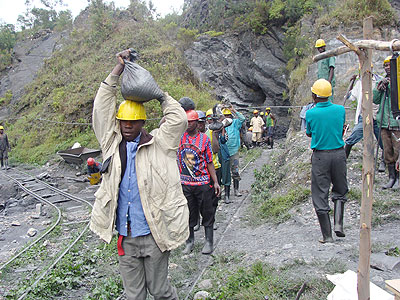The new president of Rwanda Mining Association (RMA), Jean Malik Kalima, says his main priority is to restore trust with banks and other financial institutions for local investors to access funding to upgrade their facilities and improve production.


The new president of Rwanda Mining Association (RMA), Jean Malik Kalima, says his main priority is to restore trust with banks and other financial institutions for local investors to access funding to upgrade their facilities and improve production.Kalima was elected president of the association last month replacing Jean Paul Higiro, of African Primary Tugsten, who resigned pending police investigation into his company’s alleged illegal use of mineral tags."There is a common misconception that Rwanda has very little mineral reserves and this has made it difficult for local investors to acquire loans to reinvest in their businesses. That is why most of the large investments are made by foreign investors,” Kalima said in an interview with The New Times."Our plan is to improve the quality of the minerals we export by upgrading them through semi-industrial processing plants. This will be possible if our sector is trusted and understood perfectly by financial institutions as a leading revenue generating sector in this country.”The mining sector fetched over $150 million in foreign earnings, $11million more than tea and coffee combined.The improvement in 2011 compared to previous years is due to the overall increase in the international prices of tin, coltan and wolfram, which are Rwanda’s main minerals."The mining sector employs over 32,000 Rwandans, most of who are artisanal miners living upcountry around the mine concessions without any other source of income. Part of our mandate is to create employment for another 3,000 people this year. These are major plans that need support,” Kalima explained.He added that although the mining sector has received criticism for irregularities both from international bodies and local authorities, most of the flaws had been done away with."In the region, we are still the leaders in the implementation of the mineral traceability tagging scheme; most of the mining companies operate within the laws and understand the repercussions of going against them,” he insisted."Concerning environmental protection, we have had positive remarks from environment authorities who have inspected mining concessions and proved that we have put in place measures to protect the environment. In the past we had notorious firms that continuously washed their minerals in rivers, but after suspensions and fines, they are now observing the required environment standards.”To engage in the mineral trade, the Ministry of Natural Resources requires interested parties to submit an application for a research licence together with an environmental assessment report."You cannot research, exploit, purchase and sell minerals without a licence; in order to adhere to the law, mining firms must always allow authorities access to monitor their activities. These are signs indicating the maturity of the sector and our desire is to ensure we deal with credible mineral resources,” Kalima observed. There are over 30 mining firms operating in the country.


